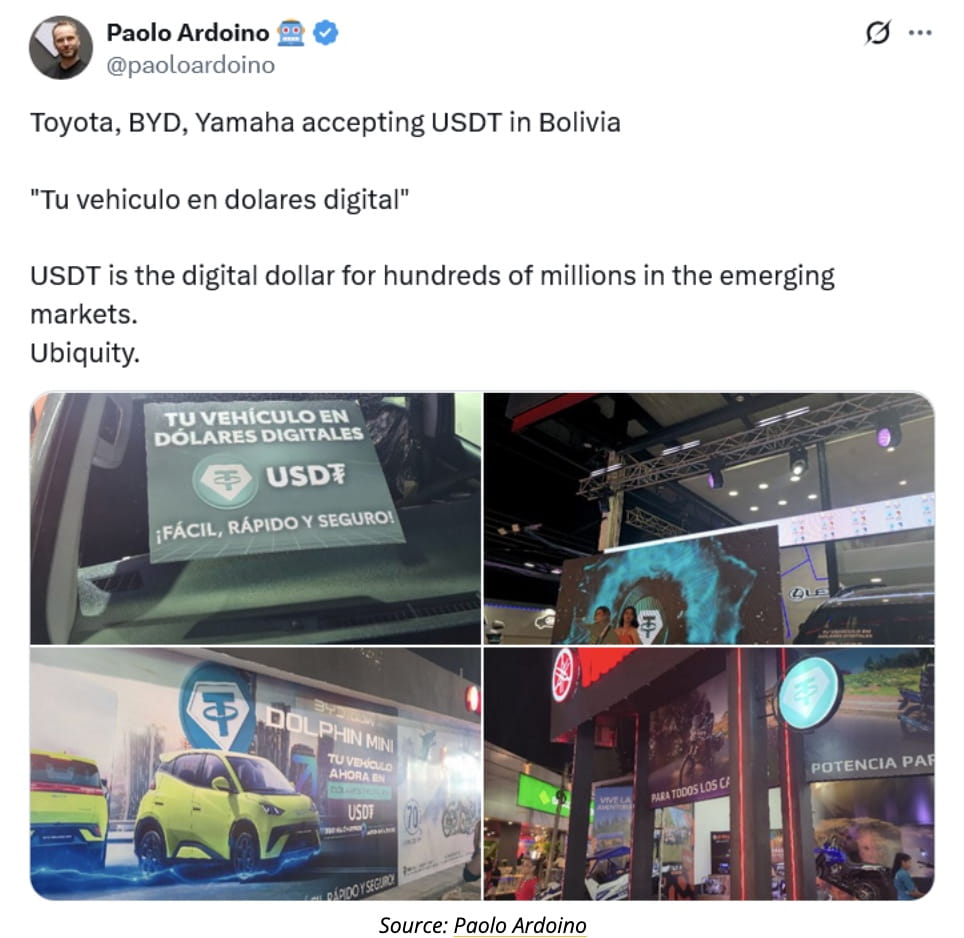Key Takeaways:
Toyota, Yamaha, and BYD dealerships in Bolivia now accept Tether (USDT) payments.
Bolivia’s foreign reserves have collapsed 98% since 2014, fueling reliance on stablecoins.
Businesses are increasingly using USDT for international trade and local purchases.
October’s presidential run-off could determine the country’s future crypto policy.
Global Automakers Embrace USDT in Bolivia
Tether adoption in Bolivia has reached a new milestone, with Toyota, Yamaha, and BYD dealerships now accepting USDT for vehicle payments.
Tether CEO Paolo Ardoino shared photos of dealerships displaying “easy, fast, and safe” USDT payment signs. BitGo, which partnered with Tether and Toyota Bolivia, confirmed the first car purchase with USDT over the weekend, with secure self-custody solutions enabling smooth transactions.
This marks a dramatic shift for Bolivia, which only lifted its long-standing crypto ban in June 2024, allowing banks to process Bitcoin (BTC) and stablecoin transactions.
Stablecoins Fill Dollar Shortage Gap
Bolivia is grappling with one of the deepest currency crises in Latin America. Foreign reserves have plunged from $12.7 billion in 2014 to just $171 million in August 2025 (Trading Economics).
While the Bolivian boliviano remains the main currency, locals and businesses increasingly turn to stablecoins to preserve value and facilitate trade. In March, state-owned oil giant YPFB began accepting crypto for fuel imports to offset the U.S. dollar shortage.

Gabriel Campa, TowerBank’s head of digital assets, noted that Bolivian businesses are building a “stablecoin circular economy.” Importers buy USDT locally or via offshore accounts, convert it to USD, and pay suppliers — with some goods now priced directly in USDT.
Daily USDT liquidity in Bolivia has surged from $20,000 to nearly $1 million in under a year, according to Bitfinex.
October Run-Off
Bolivia’s crypto trajectory could hinge on the upcoming Oct. 19 presidential run-off. Candidate Rodrigo Paz Pereira has pledged to use blockchain technology for anti-corruption reforms, while Jorge “Tuto” Quiroga has been less clear on his crypto stance.
The outcome will decide whether Bolivia continues on its fast-track adoption of stablecoins and blockchain or takes a more cautious regulatory approach.

